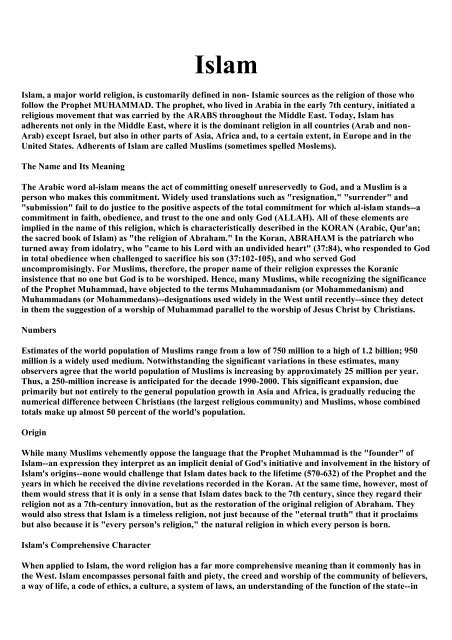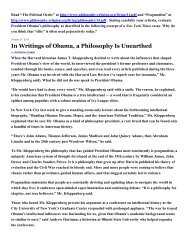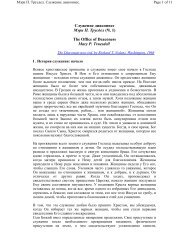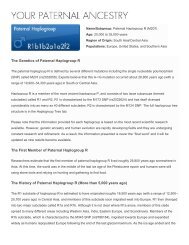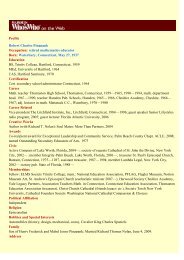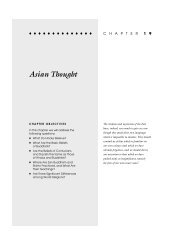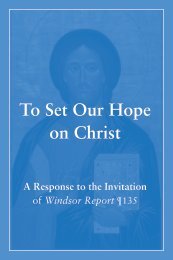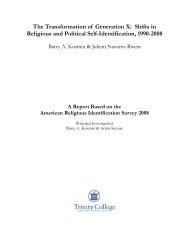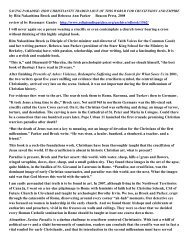Islam - Philosophy and Religion
Islam - Philosophy and Religion
Islam - Philosophy and Religion
You also want an ePaper? Increase the reach of your titles
YUMPU automatically turns print PDFs into web optimized ePapers that Google loves.
<strong>Islam</strong><br />
<strong>Islam</strong>, a major world religion, is customarily defined in non- <strong>Islam</strong>ic sources as the religion of those who<br />
follow the Prophet MUHAMMAD. The prophet, who lived in Arabia in the early 7th century, initiated a<br />
religious movement that was carried by the ARABS throughout the Middle East. Today, <strong>Islam</strong> has<br />
adherents not only in the Middle East, where it is the dominant religion in all countries (Arab <strong>and</strong> non-<br />
Arab) except Israel, but also in other parts of Asia, Africa <strong>and</strong>, to a certain extent, in Europe <strong>and</strong> in the<br />
United States. Adherents of <strong>Islam</strong> are called Muslims (sometimes spelled Moslems).<br />
The Name <strong>and</strong> Its Meaning<br />
The Arabic word al-islam means the act of committing oneself unreservedly to God, <strong>and</strong> a Muslim is a<br />
person who makes this commitment. Widely used translations such as "resignation," "surrender" <strong>and</strong><br />
"submission" fail to do justice to the positive aspects of the total commitment for which al-islam st<strong>and</strong>s--a<br />
commitment in faith, obedience, <strong>and</strong> trust to the one <strong>and</strong> only God (ALLAH). All of these elements are<br />
implied in the name of this religion, which is characteristically described in the KORAN (Arabic, Qur'an;<br />
the sacred book of <strong>Islam</strong>) as "the religion of Abraham." In the Koran, ABRAHAM is the patriarch who<br />
turned away from idolatry, who "came to his Lord with an undivided heart" (37:84), who responded to God<br />
in total obedience when challenged to sacrifice his son (37:102-105), <strong>and</strong> who served God<br />
uncompromisingly. For Muslims, therefore, the proper name of their religion expresses the Koranic<br />
insistence that no one but God is to be worshiped. Hence, many Muslims, while recognizing the significance<br />
of the Prophet Muhammad, have objected to the terms Muhammadanism (or Mohammedanism) <strong>and</strong><br />
Muhammadans (or Mohammedans)--designations used widely in the West until recently--since they detect<br />
in them the suggestion of a worship of Muhammad parallel to the worship of Jesus Christ by Christians.<br />
Numbers<br />
Estimates of the world population of Muslims range from a low of 750 million to a high of 1.2 billion; 950<br />
million is a widely used medium. Notwithst<strong>and</strong>ing the significant variations in these estimates, many<br />
observers agree that the world population of Muslims is increasing by approximately 25 million per year.<br />
Thus, a 250-million increase is anticipated for the decade 1990-2000. This significant expansion, due<br />
primarily but not entirely to the general population growth in Asia <strong>and</strong> Africa, is gradually reducing the<br />
numerical difference between Christians (the largest religious community) <strong>and</strong> Muslims, whose combined<br />
totals make up almost 50 percent of the world's population.<br />
Origin<br />
While many Muslims vehemently oppose the language that the Prophet Muhammad is the "founder" of<br />
<strong>Islam</strong>--an expression they interpret as an implicit denial of God's initiative <strong>and</strong> involvement in the history of<br />
<strong>Islam</strong>'s origins--none would challenge that <strong>Islam</strong> dates back to the lifetime (570-632) of the Prophet <strong>and</strong> the<br />
years in which he received the divine revelations recorded in the Koran. At the same time, however, most of<br />
them would stress that it is only in a sense that <strong>Islam</strong> dates back to the 7th century, since they regard their<br />
religion not as a 7th-century innovation, but as the restoration of the original religion of Abraham. They<br />
would also stress that <strong>Islam</strong> is a timeless religion, not just because of the "eternal truth" that it proclaims<br />
but also because it is "every person's religion," the natural religion in which every person is born.<br />
<strong>Islam</strong>'s Comprehensive Character<br />
When applied to <strong>Islam</strong>, the word religion has a far more comprehensive meaning than it commonly has in<br />
the West. <strong>Islam</strong> encompasses personal faith <strong>and</strong> piety, the creed <strong>and</strong> worship of the community of believers,<br />
a way of life, a code of ethics, a culture, a system of laws, an underst<strong>and</strong>ing of the function of the state--in
short, guidelines <strong>and</strong> rules for life in all its aspects <strong>and</strong> dimensions. While many Muslims see the SHARIA<br />
(the "way," denoting the sacred law governing the life of individuals as well as the structures of society) as<br />
fixed <strong>and</strong> immutable, others make a clear distinction between the unchangeable message of the Koran <strong>and</strong><br />
the mutable laws <strong>and</strong> regulations for Muslim life <strong>and</strong> conduct. Throughout history, practices <strong>and</strong> opinions<br />
have differed with regard to the exact way in which <strong>Islam</strong> determines life in all its aspects, but the basic<br />
notion of <strong>Islam</strong>'s comprehensive character is so intrinsic to Muslim thought <strong>and</strong> feeling that neither the past<br />
history of the Muslim world nor its present situation can be understood without taking this characteristic<br />
into consideration.<br />
According to Muslim jurists, the sharia is derived from four sources--the Koran; the sunna ("customs") of<br />
the Prophet, which are embodied in the hadith ("tradition"); qiyas ("analogy"; the application of a decision<br />
of the past, or the principles on which it was based, to new questions); <strong>and</strong> ijma ("consensus"; the consensus<br />
of the community of believers, who, according to a saying of the Prophet, would not agree on any error).<br />
HISTORY AND SPREAD OF ISLAM<br />
The Prophet<br />
Muhammad was born in 570 in MECCA, a trading center in western Arabia. About 610 he received the<br />
first of a series of revelations that convinced him that he had been chosen as God's messenger. He began to<br />
preach the message entrusted to him-- that there is but one God, to whom all humankind must commit<br />
themselves. The polytheistic Meccans resented Muhammad's attacks on their gods <strong>and</strong> finally he emigrated<br />
with a few followers to MEDINA. This migration, which is called the Hegira (Hijrah), took place in 622;<br />
Muslims adopted the beginning of that year as the first year of their lunar calendar (Anno Hegirae, or AH).<br />
At Medina Muhammad won acceptance as a religious <strong>and</strong> military leader. Within a few years he had<br />
established control of the surrounding region, <strong>and</strong> in 630 he finally conquered Mecca. There, the KAABA, a<br />
shrine that had for some time housed the idols of the pagan Meccans, was rededicated to the worship of<br />
Allah, <strong>and</strong> it became the object of pilgrimage for all Muslims. By the time of his death in 632, Muhammad<br />
had won the allegiance of most of the Arab tribespeople to <strong>Islam</strong>. He had laid the foundation for a<br />
community (umma) ruled by the laws of God.<br />
The Koran records that Muhammad was the Seal of the Prophets, the last of a line of God's messengers that<br />
began with Adam <strong>and</strong> included Abraham, Noah, Moses, <strong>and</strong> Jesus. He left for the future guidance of the<br />
community the words of God revealed to him <strong>and</strong> recorded in the Koran, <strong>and</strong> the sunna, the collective name<br />
for his opinions <strong>and</strong> decisions as recorded in the tradition literature (hadith).<br />
A Rapidly Growing Empire, 632-750<br />
After the death of Muhammad, a successor (khalifa, or caliph; see IMAM) was chosen to rule in his place.<br />
The first caliph, the Prophet's father-in-law, ABU BAKR (r. 632-34), initiated an expansionist movement<br />
that was carried out most successfully by the next two caliphs, UMAR I (r. 634-44) <strong>and</strong> Uthman (r. 644- 56).<br />
By 656 the CALIPHATE included the whole Arabian peninsula, Palestine <strong>and</strong> Syria, Egypt <strong>and</strong> Libya,<br />
Mesopotamia, <strong>and</strong> substantial parts of Armenia <strong>and</strong> Persia. Following the assassination of Uthman, the<br />
disagreements between those upholding the rights of the fourth caliph, ALI (r. 656-61), the Prophet's son-inlaw,<br />
<strong>and</strong> their opponents led to a division in the Muslim community between the SHIITES <strong>and</strong> the<br />
SUNNITES that still exists today. When the governor of Syria, MUAWIYA I, came to power after the<br />
murder of Ali, the Shiites refused to recognize him <strong>and</strong> his successors.<br />
Muawiya inaugurated an almost 90-year rule by the UMAYYADS (661 -750), who made Damascus their<br />
capital. A second wave of expansion followed. After they conquered (670) Tunisia, Muslim troops reached<br />
the northwestern point of North Africa in 710. In 711 they crossed the Strait of Gibraltar, rapidly overran<br />
Spain, <strong>and</strong> penetrated well into France until they were turned back near Poitiers in 732. On the northern
frontier Constantinople was besieged more than once (though without success), <strong>and</strong> in the east the Indus<br />
River was reached; the <strong>Islam</strong>ic empire now bordered China <strong>and</strong> India, with some settlements in the Punjab.<br />
Rival Dynasties <strong>and</strong> Competing Capitals (Baghdad, Cordoba, Cairo), 750-1258<br />
In 750, Umayyad rule in Damascus was ended by the ABBASIDS, who moved the caliphate's capital to<br />
Baghdad. The succeeding period was marked more by an expansion of horizons of thought than by<br />
geographical expansion. In the fields of literature, the sciences, <strong>and</strong> philosophy, contributions by such<br />
Muslim scholars as al-KINDI, al-FARABI, <strong>and</strong> Ibn Sina (AVICENNA) far surpassed European<br />
accomplishments of that time.<br />
Politically, the power of the Abbasids was challenged by a number of rival dynasties. These included an<br />
Umayyad dynasty in Cordoba, Spain (756-1031); the FATIMIDS, a dynasty connected with the ISMAILIS<br />
(a Shiite sect), who established (909) themselves in Tunisia <strong>and</strong> later (969-1171) ruled Egypt; the<br />
ALMORAVIDS <strong>and</strong> the ALMOHADS, Muslim Berber dynasties that successively ruled North Africa <strong>and</strong><br />
Spain from the mid-11th to the mid-13th century; the SELJUKS, a Muslim Turkish group that seized<br />
Baghdad in 1055 <strong>and</strong> whose defeat of the Byzantines in 1071 led indirectly to the Christian CRUSADES<br />
(1096-1254) against the <strong>Islam</strong>ic world; <strong>and</strong> the AYYUBIDS, who displaced the Fatimids in Egypt <strong>and</strong><br />
played an important role in the later years of the Crusades.<br />
The Abbasids were finally overthrown (1258) in Baghdad by the MONGOLS, although a family member<br />
escaped to Egypt, where he was recognized as caliph. While the brotherhood of faith remained a reality, the<br />
political unity of the Muslim world was definitely broken.<br />
Two Great <strong>Islam</strong>ic Powers: The Ottomans <strong>and</strong> the Moguls, 15th-18th Century<br />
The Ottoman Turkish dynasty, founded by OSMAN I (c.1300), became a major world power in the 15th<br />
century, <strong>and</strong> continued to play a very significant role throughout the 16th <strong>and</strong> 17th centuries. The<br />
BYZANTINE EMPIRE, with which Muslim armies had been at war since the early days of <strong>Islam</strong>, came to<br />
an end in 1453 when Ottoman sultan MEHMED II conquered Constantinople. That city then became the<br />
capital of the OTTOMAN EMPIRE.<br />
In the first half of the 16th century, Ottoman power, already firmly established over all Anatolia <strong>and</strong> in<br />
most of the Balkans, gained control over Syria, Egypt (the sultans assumed the title caliph after deposing the<br />
last Abbasid in Cairo), <strong>and</strong> the rest of North Africa. It also exp<strong>and</strong>ed significantly northwestward into<br />
Europe, besieging Vienna in 1529. The defeat of the Ottoman navy in the Battle of LEPANTO in 1571 was<br />
not, as many in Europe hoped, the beginning of a rapid disintegration of the Ottoman Empire; more than<br />
one hundred years later, in 1683, Ottoman troops once again besieged Vienna. The decline of the empire<br />
becomes more visible from the late 17th century onward, but it survived through World War I. Turkey<br />
became a republic under Kemal ATATURK in 1923, <strong>and</strong> the caliphate was abolished in 1924.<br />
The MOGULS were a Muslim dynasty of Turko-Mongol origin who conquered northern India in 1526. The<br />
Mogul Empire reached the climax of its power in the period from the late 16th century until the beginning<br />
of the 18th century. Under the emperors AKBAR, JAHANGIR, SHAH JAHAN, <strong>and</strong> AURANGZEB, Mogul<br />
rule was extended over most of the subcontinent, <strong>and</strong> <strong>Islam</strong>ic culture (with a strong Persian flavor) was<br />
firmly implanted in certain areas. The splendor of the Moguls is reflected in a special way in their<br />
architecture. In the 18th century Mogul power began to decline. It survived, at least in name, however, until<br />
1858, when the last sultan was dethroned by the British.<br />
Two Examples of the Coming of <strong>Islam</strong> in Frontier Areas: Indonesia <strong>and</strong> West Africa<br />
While there may have been sporadic contacts from the 10th century onward with Muslim merchants, it was<br />
only in the 13th century that <strong>Islam</strong> clearly established itself in Sumatra, where small Muslim states formed
on the northeast coast. <strong>Islam</strong> spread to Java in the 16th century, <strong>and</strong> then exp<strong>and</strong>ed, generally in a peaceful<br />
manner, from the coastal areas inward to all parts of the Indonesian archipelago. By the 19th century it had<br />
reached to the northeast <strong>and</strong> extended into the Philippines. Today there are 140 million Muslims in<br />
Indonesia, constituting about 85 percent of the population.<br />
<strong>Islam</strong> penetrated West Africa in three main phases. The first was that of contacts with Arab <strong>and</strong> Berber<br />
caravan traders, from the 10th century onward. Then followed a period of gradual <strong>Islam</strong>ization of some<br />
rulers' courts, among them that of the famous MANSA MUSA (r. 1312-27) in Mali. Finally, in the 16th<br />
century the Sufi orders (brotherhoods of mystics; see SUFISM), especially the Qadiriyya, Tijaniyya, <strong>and</strong><br />
Muridiyya, as well as individual saints <strong>and</strong> scholars, began to play an important role. The 19th century<br />
witnessed more than one JIHAD (holy war) for the purification of <strong>Islam</strong> from pagan influences, while later<br />
in the 19th century <strong>and</strong> in the first half of the 20th century, Muslims formed a significant element in the<br />
growing resistance to colonial powers. In the post-colonial period <strong>Islam</strong> plays an important role in Nigeria,<br />
Senegal, Guinea, Mali, <strong>and</strong> Niger, while there are smaller Muslim communities in the other states in West<br />
Africa.<br />
<strong>Islam</strong> in Modern History<br />
Napoleon's invasion of Egypt in 1798, followed three years later by the expulsion of the French troops by the<br />
combined British-Ottoman forces, is often seen as the beginning of the modern period in the history of<br />
<strong>Islam</strong>. The coming to power of MUHAMMAD ALI (r. 1805-49) <strong>and</strong> the modernization of Egypt under his<br />
leadership was the beginning of a long struggle throughout the Muslim world to reestablish independence<br />
from the colonial powers <strong>and</strong> for Muslim countries to assume their place as autonomous states in the<br />
modern world. Resistance to foreign domination <strong>and</strong> an awareness of the need to restore the Muslim<br />
community to its proper place in world history are integral parts of the pan-<strong>Islam</strong>ic efforts of JAMAL AL-<br />
DIN AL-AFGHANI as well as the nationalist movements of the 20th century.<br />
The political, social, <strong>and</strong> economic developments in the various countries with Muslim majorities show<br />
significant differences. For example, Turkey <strong>and</strong> many of the Arab countries have become secular republics,<br />
whereas Saudi Arabia is virtually an absolute monarchy, ruled under Muslim law. Iran was ruled from<br />
1925 to 1979 by the Pahlavi dynasty, which stressed secularization <strong>and</strong> westernization. Growing resistance<br />
from the Muslim community, which is overwhelmingly Shiite, culminated in the forced departure of the<br />
shah <strong>and</strong> the establishment of an <strong>Islam</strong>ic republic under the leadership of the Ayatollah KHOMEINI.<br />
Pakistan too is an <strong>Islam</strong>ic republic in which the constitution provides for the enforcement of Muslim law by<br />
the state. However, despite differences, the great majority of Muslims hold fast to the idea of the<br />
comprehensive character of <strong>Islam</strong> as well as to its basic theological doctrines.<br />
ISLAMIC DOCTRINES<br />
<strong>Islam</strong>ic doctrines are commonly discussed <strong>and</strong> taught widely-- often by means of a catechism, with questions<br />
<strong>and</strong> answers-- under six headings: God, angels, Scriptures, messengers, the Last Day, <strong>and</strong> predestination.<br />
The Muslims' notion of God (Allah) is, in a sense, interrelated with all of the following points <strong>and</strong> will be<br />
referred to below. Some of the angels (all of whom are servants of God <strong>and</strong> subject to him) play a<br />
particularly important role in the daily life of many Muslims: the guardian angels; the recording angels<br />
(those who write down a person's deeds, for which he or she will have to account on Judgment Day); the<br />
angel of death; <strong>and</strong> the angels who question a person in the tomb. One of those mentioned by name in the<br />
Koran is Jibril (see GABRIEL, angel), who functioned in a special way as a transmitter of God's revelation<br />
to the Prophet. The importance of the Muslim recognition of Scriptures other than the Koran <strong>and</strong> of<br />
messengers other than Muhammad will be referred to below.<br />
The promise <strong>and</strong> threat of the Last Day, which occupy an important place in the Koran, continue to play a<br />
major role in Muslim thought <strong>and</strong> piety. On the Last Day, of which only God knows the hour, every soul<br />
will st<strong>and</strong> alone <strong>and</strong> will have to account for its deeds. In the theological discussions of the Last Day <strong>and</strong>, in
general, of the concept of God, a significant issue has been whether the descriptions in the Koran (of<br />
HEAVEN <strong>and</strong> HELL, the vision of God, God being seated on the throne, the h<strong>and</strong>s of God, <strong>and</strong> so on)<br />
should be interpreted literally or allegorically. The majority view accepts the principle of literal<br />
interpretation (God is seated on the throne, he has h<strong>and</strong>s), but adds the warning <strong>and</strong> qualification that<br />
humans cannot state <strong>and</strong> should not ask how this is the case, since God is incomparable (bila kayf, "without<br />
how"; bila tashbih, "beyond comparison").<br />
The last of the six articles, PREDESTINATION, is also a theocentric issue. Because the divine initiative is<br />
all- decisive in bringing humans to faith ("had God not guided us, we had surely never been guided," 7:43),<br />
many concluded that God is not only responsible for guiding some, but also for not guiding others <strong>and</strong><br />
allowing them to go astray or even leading them astray. In the debate of later theologians on these questions,<br />
the antipredestinarians were concerned less with upholding the notion of human freedom <strong>and</strong>, therefore, of<br />
human dignity, than with defending the honor of God. According to these thinkers--the Qadarites <strong>and</strong> the<br />
Mutazilites, of the 8th to 10th centuries--the Koranic message of the justice of God "who does not wrong<br />
people" ("they wrong themselves," 43:76) excluded the notion of a God who would punish human beings for<br />
evil deeds <strong>and</strong> unbelief for which they themselves were not really responsible. The major concern of their<br />
opponents was to maintain, against any such reasoning, the doctrine of the sovereign freedom of God, upon<br />
whom no limits can be placed, not even the limit of "being bound to do what is best for his creatures." Two<br />
important theologians of the 10th century, al- Ashari (d. 935) <strong>and</strong> al-Maturidi (d. 944), formulated answers<br />
that would mark for the centuries to come the traditional (Sunni) position on these points. Although one's<br />
acts are willed <strong>and</strong> created by God, one has to appropriate them to make them one's own. A recognition of a<br />
degree of human responsibility is combined with the notion of God as the sole creator, the One <strong>and</strong> Only.<br />
Around this concept of the unity of God another debate arose on the essence <strong>and</strong> attributes of God; it<br />
focused on the question whether the Koran--God's speech--was created or uncreated. Those who held that<br />
the Koran was created believed that the notion of an uncreated Koran implied another eternal reality<br />
alongside God, who alone is eternal <strong>and</strong> does not share his eternity with anyone or anything else. Their<br />
opponents felt that the notion of a created Koran detracted from its character as God's own speech. The<br />
Sunni position that emerged from these discussions was that the Koran as written down or recited is<br />
created, but that it is a manifestation of the eternal "inner speech" of God, which precedes any articulation<br />
in sounds <strong>and</strong> letters.<br />
None of the theological issues referred to above can be understood fully unless the sociopolitical context of<br />
these doctrinal debates is taken into consideration. The interrelation between theological positions <strong>and</strong><br />
political events is particularly clear in the first issues that arose in the history of <strong>Islam</strong>. Reference has<br />
already been made to the division between the Shiites <strong>and</strong> the Sunnites. The Shiites were those who<br />
maintained that only "members of the family" (Hashimites, or, in the more restricted sense, descendants of<br />
the Prophet via his daughter, FATIMA <strong>and</strong> her husb<strong>and</strong> Ali) had a right to the caliphate. Another group,<br />
the Kharijites (literally "those who seceded"), broke away from Ali (who was murdered by one of their<br />
members) <strong>and</strong> from the Umayyads. They developed the doctrine that confession, or faith, alone did not<br />
make a person a believer <strong>and</strong> that anyone committing grave sins was an unbeliever destined to hell. They<br />
applied this argument to the leaders of the community, holding that caliphs who were grave sinners could<br />
not claim the allegiance of the faithful. While the mainstream of Muslims accepted the principle that faith<br />
<strong>and</strong> works must go together, they rejected the Kharijite ideal of establishing here on Earth a pure<br />
community of believers, insisting that the ultimate decision on whether a person is a believer or an<br />
unbeliever must be left to God. Suspension of the answer until Judgment Day enabled them to recognize<br />
anyone accepting the "five pillars" (see below) as a member of the community of believers, <strong>and</strong> to recognize<br />
those Muslims who had political authority over them, even if they objected to some of their practices.<br />
ISLAMIC WORSHIP, PRACTICES, AND DUTIES<br />
The extent to which faith <strong>and</strong> works go together is evident from the traditional listing of the basic duties of<br />
any Muslim, the "five pillars" of <strong>Islam</strong>: shahada, the profession of faith in God <strong>and</strong> the apostleship of
Muhammad; salat, the ritual prayer, performed five times a day facing Mecca; zakat, almsgiving; sawm<br />
(fasting), abstaining from food <strong>and</strong> drink during the daylight hours of the month of RAMADAN; <strong>and</strong> hajj,<br />
the pilgrimage to Mecca, incumbent on every believer who is financially <strong>and</strong> physically able to undertake it.<br />
The witness to God st<strong>and</strong>s here side by side with the concern for the poor, reflected in almsgiving. The<br />
personal involvement of the individual believer, expressed most clearly in the formulation of the shahada, "I<br />
witness there is no God but God, <strong>and</strong> Muhammad is the messenger of God," is combined with a deep<br />
awareness of the strength that lies in the fellowship of faith <strong>and</strong> the community of all believers, significant<br />
dimensions of both the ritual prayer <strong>and</strong> the pilgrimage.<br />
Muslim worship <strong>and</strong> devotion are not limited to the precisely prescribed words <strong>and</strong> gestures of the salat, but<br />
find expression also in a wealth of personal prayers, in the gathering of the congregation in the central<br />
mosque on Fridays, <strong>and</strong> in the celebration of the two main festivals: Id al-Fitr, the festival of the breaking of<br />
the fast at the end of Ramadan; <strong>and</strong> Id al- Adha, the festival of the sacrifice (in memory of Abraham's<br />
willingness to sacrifice his son). The latter, observed on the 10th day of the month of pilgrimage, is<br />
celebrated not only by the participants in the pilgrimage, but also simultaneously by those who stay in their<br />
own locations. The interpretations of jihad (literally, "striving" in the way of God), sometimes added as an<br />
additional duty, vary from sacred war to striving to fulfill the ethical norms <strong>and</strong> principles expounded in the<br />
Koran.<br />
ISLAMIC VIEWS OF OTHER RELIGIONS<br />
<strong>Islam</strong> is definitely an inclusivistic religion in the sense that it recognizes God's sending of messengers to all<br />
peoples <strong>and</strong> his granting of "Scripture <strong>and</strong> Prophethood" to Abraham <strong>and</strong> his descendants, the latter<br />
resulting in the awareness of a very special link between Muslims, Jews, <strong>and</strong> Christians as all Abraham's<br />
children. Throughout history there have been believers who discerned the Truth of God <strong>and</strong> responded to<br />
him in the right manner, committing themselves to him alone. Of these "Muslims before Muhammad," the<br />
Koran mentions, among others, Abraham <strong>and</strong> his sons, Solomon <strong>and</strong> the queen of Sheba, <strong>and</strong> the disciples<br />
of Jesus. This inclusiveness is also expressed in the Muslim recognition of earlier Scriptures, namely, the<br />
Taurat (Torah) given to Moses, the Zabur (Psalms) of David, <strong>and</strong> the Injil (Gospel) of Jesus.<br />
This recognition of other prophets besides Muhammad <strong>and</strong> other Scriptures besides the Koran is coupled<br />
with the firm conviction that the perfection of religion <strong>and</strong> the completion of God's favor to humanity have<br />
been realized in the sending down of the Koran, the sending of Muhammad as "the Seal of the Prophets,"<br />
<strong>and</strong> the establishing of <strong>Islam</strong>. People's reactions <strong>and</strong> response to this final criterion of truth became,<br />
therefore, the evidence of their faith or unbelief. Those who, on the basis of what they had previously<br />
received from God, recognize the message of the Koran as the ultimate Truth show themselves thereby as<br />
true believers, while those who reject it prove themselves to be unbelievers, no matter by what name they<br />
call themselves.<br />
Willem A. Bijlefeld www.philosophy-religion.org/world/islam_intro.htm<br />
Bibliography:<br />
GENERAL: Bulliet, R. W., <strong>Islam</strong>: A View from the Edge (1994); Cragg, K., <strong>and</strong> Speight, R. M., The House<br />
of <strong>Islam</strong>, 3d ed. (1988); Esposito, John L., <strong>Islam</strong> (1988); Gibb, H. A. R., Mohammedanism (1949; repr.<br />
1975); Hitti, P. K., <strong>Islam</strong>, A Way of Life (1970); Lapidus, I. M., A History of <strong>Islam</strong>ic Societies (1988); Lewis,<br />
B., ed., <strong>Islam</strong> <strong>and</strong> the Arab World (1976); Nasr, S. H., Ideals <strong>and</strong> Realities of <strong>Islam</strong> (1966; repr. 1983);<br />
Schacht, J., <strong>and</strong> Bosworth, C. E., eds., The Legacy of <strong>Islam</strong>, 2d ed. (1974); Watt, W. M., What Is <strong>Islam</strong>?<br />
(1968).<br />
ISLAM IN MODERN HISTORY: Akhtar, S., A Faith for All Seasons (1991); Cragg, K., The Call of the<br />
Minaret, 2d rev. ed. (1985); Daniel, N., <strong>Islam</strong> <strong>and</strong> the West (1989); Esposito, J., ed., <strong>Islam</strong> <strong>and</strong> Politics, 3d
ed. (1991); Nasr, S. H., Traditional <strong>Islam</strong> in the Modern World (1987; repr. 1989); Smith, W. C., <strong>Islam</strong> in<br />
Modern History (1959); Watt, W. M., <strong>Islam</strong>ic Fundamentalism <strong>and</strong> Modernity (1988).<br />
SOCIOLOGY OF ISLAM AND ETHNOGRAPHICAL DATA: Ahmed, Leila, Women <strong>and</strong> Gender in <strong>Islam</strong><br />
(1992); Al Faruqi, I., <strong>and</strong> Lamya, L., The Cultural Atlas of <strong>Islam</strong> (1986); Geller, E., Muslim Society (1981);<br />
Levy, R., The Social Structure of <strong>Islam</strong> (1957; repr. 1965); Weekes, R., ed., Muslim Peoples: A World<br />
Ethnographic Survey, 2 vols., 2d ed. (1984).


